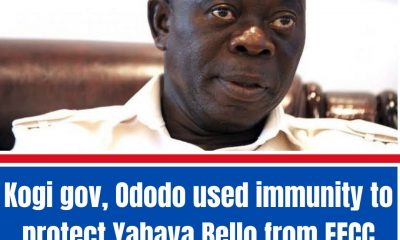Business
You can be classy, sexy and still be a farmer – Amaka Chukwudum
TRACKING >A graduate of English Education with a Master’s degree from the Netherlands, a farm is certainly the ast place anyone would expect to meet this former banker.
But AmakaChukwudum is a proud farmer who has since 2012 clung passionately to organic farming, food processing and exportation of farm produce from across Nigeria.
The CEO of Amicable Mondiale, an agricultural outfit which she describes as a global network of farmers, Chukwudum grows all kinds of seedlings and assists aspiring organic farmers in the establishment of farms.
She also strives to help children appreciate farming(animal and crop) on the platform of Amicable Mondiale Little Speckles, an initiative which engages in school to school orientation on agriculture. She had an encounter with Weekend Woman.
Why farming?
My parents were farmers. My father was a pig farmer but my mum was a teacher and a poultry farmer. So, I grew up loving agriculture from my parents. I learned it first hand from them before I went to study it. I studied English Education, hold a Master’s degree from the Netherlands, was trained in Germany, worked in a logistics firm and also in the banking industry, but my passion couldn’t quell. I managed to teach to carry on with my certificate but my passion couldn’t just be limited. So I had to enter the bush.
What is the concept behind Amicable Mondiale?
We grow seeds and help farmers set up their farms. We also process mostly agricultural produce from other farmers. We have our black soap, we process our honey, produce palm oil, body butters and also train farmers.
Korea awards masters degree scholarship to 13 Nigerians(Opens in a new browser tab)
We realized that many farmers are closing up because of capital; many people will keep telling you agriculture is capital, but we are of the opinion that farming can be run on five percent of the capitals Nigerians use to run their farms. Have you ever wondered why the oyinbos will bring in their chickens and they will be cheaper than Nigerian-bred chickens? It is because they do what we call organic farming. In organic farming, you recycle your waste. The chicken waste can actually be recycled back into feed. And that would reduce the cost of your production to five percent. So, the major thing we do is training farmers on organic farming.
Some people feel organic farming is overrated. Tell us why it isn’t?
Organic farming is growing your crops without chemicals; the natural way. Most people buy and use inorganic fertilizers for growing their crops. All these are waste of money. Have you asked why grasses you stomped on in the morning are still green and thriving by evening but you step on your corn in the farm and they die? Grasses are naturally endowed with something that makes them resilient. So we can dig compost pits, extract these things from grasses that make them strong and then input into our own crop? We teach farmers on how to recycle even the grass in their farms so that they become useful. That way, instead of buying fertilizers, you turn the things on your farms to fertilizers. Growing maggots for your fish make them very big. Maggots on their own have 44 percent of nutrients your fishes and poultry need to grow big.
Organic farming helps in the recycling of the ecosystem. It balances the ecosystem. We have seen that the weather is too hot. It is because most of us do not balance the ecosystem. Organic food is healthier than any synthetic food you could buy in the market. So, organic food is the way to go; it is cheaper, healthier, balances the ecosystem and a lot more. You hardly fall sick when you eat organic food. Take for example the white sugar we consume daily. We have tamarind in Nigeria in excess and it has the capacity to take care of the human liver. Our job is to educate farmers; we go from state to state, to train them. Another project we did was on children. We exposed them to agriculture early, made them see the beauty in agriculture and appreciate it as an occupation.
I’m sure your parents who exposed you to farming didn’t have to do research; what led you into research?
My father died of cancer. I was hurt and I began to do research. Apart from him exposing me to agriculture early in life, I felt nature has provided us with the needed roots to take care of our health. That took me into research and that was how I got to know other things that could help our body build immunity against cancer. That led me into food processing.
Instead of waiting for diseases to hit you and you start spending a fortune on treatments, build yourself against them! I began to grow nature’s immune boosters. My parents were animal farmers but I went into crop and I can categorically tell you it has been an interesting journey. My happiest moment is when I am in the farm. No matter how sad I am, as I enter the farm, my spirit is lifted.
Farming is vast; what is your favourite type of farming?
Personally I love research and I realise that everyday, something new about crops comes up. Farming is ever evolving! My favourite is actually the production of crops.
Recently, I discovered a new and more lucrative wayof doing animal farming. I realized that chickens only use a quarter of what they produce. We waste the other three-quarter and we keep complaining that poultry farming is very expensive. Most farmers end up using it just as manure. Whereas, we teach farmers how to turn the waste back to feed and use it to feed fish, chicken, turkey and pigs. This will save almost 80% of cost in livestock farming.
FG to invest in animation industry – Osinbajo(Opens in a new browser tab)
Beyond organic farming, what else do you do?
I am a full-time farmer. I am into export. We go to the north and other parts of Nigeria where there are farmers that grow their crops but don’t have the market.We connect them with buyers, process for them and then we export. We are licensed by the Nigeria Export Commission.
What are the risks and rewards of being an organic farmer?
One of them is that organic chicken will not grow at the same pacewithan inorganic chicken because nature is gradual. It is not magical. If you are growing your broilers for example for six weeks and you are doing organic, you cannot compare it with inorganic. It will take about eight or 10 weeks for an organic chicken to be boosted like that. It takes longer and that is why it is sold at a more expensive rate. But if you understand how to recycle the feed, the cost will be brought down.
Organic farming also saves your soil from dying.
Can soil actually die?
If you are doing inorganic farming, you will notice that at a point, the yield from your soil is going down. It is the nutrient in the soil you need, not just the soil. The nutrient is being sapped without being replenished. But organic farming does not sap; it balances. As it is taking, it is giving back. So, the system is balanced.
…your parting shot?
My advice to every Nigerian youths is that today, certificate does not pay; what pays is SABIFICATE. What makes me who I am today is not my certificate; I studied abroad on scholarship but still what I studied there is not what is feeding me. What is feeding me is my SABIFICATE.
Get into that bush behind your house; that is your own national cake. If you can use that small space to grow vegetables, you can be selling from your house and you will feed your family. As a mother, whether you are a widow, single mum, or a young girl waiting for a job, you can make some fortune from the bush. And I tell you, you can still be classy and sexy as a farmer. You can look good and still be a farmer. To Nigerian youths, I advise, you don’t need to be carrying files under the sun; meet me in the bush and let us start from there.
-

 Politics5 days ago
Politics5 days agoSouth-South Govs Meet In Yenagoa, Urge FG To Review Power Situation
-

 Business5 days ago
Business5 days agoWhy CBN Banned Opay, Palmpay, Kuda Bank, Moniepoint From Boarding New Customers
-

 Politics6 days ago
Politics6 days agoKogi gov, Ododo used immunity to protect Yahaya Bello from EFCC arrest – Oshiomhole
-

 Entertainment6 days ago
Entertainment6 days ago‘Disrespectful’ – Mr Macaroni slams Wizkid for shading Don Jazzy
-

 Niger Delta6 days ago
Niger Delta6 days agoRE: PROTEST AGAINST PAP BOSS DR DENNIS OTUARU, AN UNNECESSARY DISTRACTION THAT SHOULD NOT BE TAKEN SERIOUSLY.
-

 News3 days ago
News3 days agoAttack on nurse: Enugu Assembly moves to regulate activities of masquerades
-

 Politics6 days ago
Politics6 days agoFormer IYC Scribe Congratulates Hon. Maxwell Ebibai on Reappointment as Bayelsa Commissioner for Finance.
-

 Politics5 days ago
Politics5 days agoHon. Alapala Felicitates with Commissioners for successful inauguration and thank the governor for their appointments.





